Ep Blog #10 Final Course Reflection:
12/6/2020
Before taking Cross-Cultural Psychology 420, my idea of culture was similar to the understanding of an umbrella term. As a result, I had been left with an intensely vague idea of what this concept is until having taken the course. Once having read the chapters in Cross-Cultural Psychology, I now have accommodated that culture is not only wide-ranging in breadth but also can be narrowed down in order to examine individual attributes that accentuate a society. This being said, the following course expectations have been met once having understood the material: comprehending how cultural diversity has affected culture in people’s lives, as well as having the ability to draw correlations and implement material from different course subjects as well as in other areas of life.
Rereading the initial Ep Blog that I created (which was Ep Blog #2) I can see that although I acknowledge some achievements that have taken place over my life- there is still much that I need to improve upon. This is evident in the 5 missed blog posts that I did not complete throughout the semester. Although I am capable of creating blog posts and writing about the course material, I am clearly deficient in turning in assignments on time. This being said, my initial expectation of the course continue to remain the same and have taken on a personal and also emphasized particular points that have given me a more complete view of how culture has impacted my life and the the environments that I have been exposed to.
After having spent time reading “Culture & Psychology” by Matusmoto et al., and attempting to understand the material, I find that culture is not just a broad overview of many aspects of society- but a very complex, interesting and intricate function that still continues to perplex me. This being said, before I took this class my attitude in relation to culture and psychology was vague and narrow minded, I now feel that I have a greater appreciation and understanding for how culture is diverse and the affect it has on people in every context. In particular, I am drawn to the subtle and omnipresent qualities culture appears to encompass, and how there is an argument to be made that all behavior and thought can be linked to this concept.
Furthermore, I now recognize how differing theories in psychology can be viewed with the context of cross-cultural psychology. Familiar terms like the FFM model and personality, Kohlberg’s theory on morality, as well as Erickson’s structure on the stages of identity development (and more) are all ideas that I have encountered in my previous psychology classes- but never in the context of culture and how that may impact individual’s behavior and cognitive processes. Throughout this course, I not only recognize the cultural implications but also the value in culture and its impact on human behavior and cognition.
If I were to have taken this class over again, there are two areas in which I would like to improve upon and that is: managing my time more appropriately and turning in assignments on the due date. Although I had a propensity for missing Eportfolio assignments, this should not be an indicator for how I appraise the information I have garnered throughout the semester. An area in which I believe this course further helped me to improve upon is self-awareness. After having taken this course I realize that I need to be especially careful with due dates and keeping on schedule in order to reach certain commitments. This self awareness will hopefully stimulate a future in which I can better address these challenges that I need to continue overcoming and make me a more well-rounded and timely individual.
I believe that in general, the topics that I have explored throughout this course can be applied not only in psychology but also in areas that are not psychologically oriented environments like real estate. Although I am a psychology major, I learned that my passion really lies elsewhere and for a while I had been worried that the psychology degree I am close to finishing would prove to be meaningless after having discovered what I really want to do with my life. Fortunately, psychology offers me insight into the understanding of human behavior and the mysteries surrounding this. More specifically, cultural psychology can be useful in real estate as it helps me understand which types of homes are more desirable to a community than others as well as the cultural impacts that relate to certain environments. In the field of real estate, it is important to note that certain societies encourage a national character- in which I can use to satisfy my customers by understanding whether they derive from a collectivist or individualistic culture. I hope to use this knowledge that I have gained in order to differentiate the types of features that might satisfy a collectivist oriented client versus an individualistic oriented client.
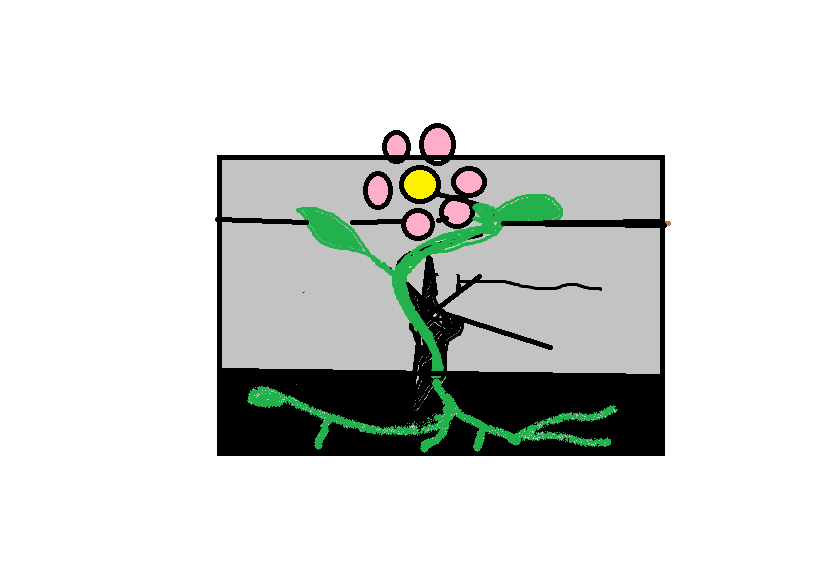
Ep Blog #9 What I Have Learned In This Course
11/16/2020
There are several concepts throughout this semester that I have found that are applicable not just in my academic life but also more so in my personal life. Some of the following posts are important indicators as to what I’ve learned and will continue to ruminate about as I continue on in life: ePost #2, ePost #5, Epost #6, and Epost #8.
As stated in my earlier Eportfolio post #2, Accountability and personal agency are qualities that I have learned that are tied to an individualistic cultures like that of the United States of America. I have realized that despite my background and moving around the world, my construal of self is based on the product of being an American and representing American ideals overseas. As stated in the book entitled: “Culture And Psychology” written by Matsumoto et al., a independent construal of self is expressed as the perception of oneself that sees how it relates to a construct larger than itself, simultaneously acknowledging it’s independence and personal agency from one another. (Matsumoto et al, P. 109). Before taking this course, I had no idea how complex culture is and how much it impacts every person all the time. It continues to surprise me at the level of complexity that can be found when understanding how individual’s navigate using culture whether they are conscious of it or not.
As previously mentioned, in my Epost #5, I mentioned that there are more individualistic ideals that I can point out about myself than I can collectivist. Though however many few those collectivist items may be, they are nonetheless significant attributes that I find central to my character and that is the statement: “I am a patriot”. Being raised overseas, I am meant to project American ideals that are what would be considered important to forming diplomatic relations when interacting with others from around the world. As such, I have noticed that my love for the United States of America is enduring whether through intense political environments or not, and it will continue to do so as I move on in life. This course has taught me that the collectivism that does exist in me is not an item that can be overlooked and that this collectivism represents the very fabric that can bring people together when they share common ground. In a time of much division, collectivism offers a hope that individual’s can find what they do share and come together to support that.
In another post entitled: “Ep Blog #6 autonomy and self-determination theory” I relate to the ideas of how this theory is implemented in cultures like the United States and how that has personally been true in my own life and the life of many others. It is interesting to have noticed that many cultures although so complex on so many levels- can also paradoxically be boiled down to two fundamentally contrasting concepts: individualism & collectivism. Although these areas can also ebb and flow and mix, primarily, they are independent of one another and can be seen in various levels of life when observing other cultures. This difference can be manifested in government and policies, community, traditions and overall whatever else makes up culture.
The final post that I find that has also impacted me is Epost #8, in which is called: “The Five Factor Model”. In the past I have stumbled across this term in my course entitled: “Adulthood & Aging Psychology” in which attempts to understand how personality either changes or doesn’t change with age. In “Culture And Psychology by Matsumoto et al, the main difference between the FFM and how it is studied in Adulthood & Aging, is it’s focus on culture as opposed to aging. In Adulthood & Aging, it is noted that personality in adulthood becomes more consistent as time goes on (Whitbourne et al,. P. 169), while in the Cross-Cultural textbook, it is made clear that the FFM model can be applied to any culture as well as be studied by McCrae and his colleagues. (Matsumoto et al, P. 131)
Overall, the representations of the following constructs are items that have made it more apparent in my own self construct and will continue to enrich my life moving forward and goes as follows: understanding my autonomy and how that relates to living in an independent culture like the U.S.A., learning the difference between an independent and collectivist construal of self, and understanding how the FFM model in my Adulthood & Aging Psychology class differs from my Cross-Cultural Psychology class. These can all be reflected in the aforementioned posts that are listed below: ePost 2, ePost 5, ePost 6, and ePost 8.
References:
Matsumoto, D. & Juang, L. (2017). Culture & Psychology (6th Edition).
CA: Wadsworth. ISBN: 978-1-305-86314-9
Whitbourne, S. K. & Whitbourne, S. B. (2020). Adult Development and Aging:
Biopsychosocial Perspectives (7th ed.). Wiley Publishers.

As one can see, I attempted to draw myself and show that I am two sides of the same coin so to speak. In the sense that I display both qualities of individualism (from the American qualities that I have grown up with) as well as the collectivist cultures (my European and exposure to cultures from other parts of the world). Each of these worldviews have had an impact on me and I feel that it wouldn’t be fair to reconcile my identity without expressing how both of these perspectives are apart of me.
Ep Blog #8 The Five Factor Model
11/16/2020
Personalities are oftentimes represented in cultural quizzes and are used as a way to categorize groups of people in every day life. According to the text called: ” Culture & Psychology” and written by Matsumoto et al., personality is defined as generally long lasting action or thought based attributes or frame of minds that individuals access in their everyday life- depending on context. (Matsumoto et al, P. 126) It is by understanding the definition of personality researchers and other can begin to pinpoint what is a consistent pattern of behavior or thought in a person, and how that impacts their life as well as those around them. One of the studies in which does this type of research is the Five-Factor Model (FFM) created by Robert R. McCrae and his coworkers. (Matsumoto et al, P. 126) This indicator has 5 over reaching personalities that McCrae and his colleagues found to be repeated in different cultures- and have attempted to use this as a measure for doing personality studies. (Matsumoto et al, P. 126)
The FFM originated from a test known as the NEO Personality Inventory, where there were 240 questions used to narrow down on a person’s personality. (Matsumoto et al, P. 126) I have taken this test in the past and although there are moments when I find this test accurate, I also realize the limitations that are associated with an indicator such as this. One of the issues that I have seen overtime is that as I age, this impacts my answers and therefore impacts my results. Thus, causing my personality to change overtime. As stated previously in the definition of personality, it is meant to capture the long=lasting or enduring characteristics that manifest as a result of our thoughts or behaviors. However, if my answers change overtime, then this might not be the most reliable source of personality insight. Overall, I have scored high in areas like neuroticism due to my extensive habits to worry as well as imagine the worst possible outcomes in the future. Overall, I do find that this is a consistent finding when I repeat the test, however, the other areas that are marked often times change depending on the mood that I am in.
References:
Matsumoto, D. & Juang, L. (2017). Culture & Psychology (6th Edition).
CA: Wadsworth. ISBN: 978-1-305-86314-9
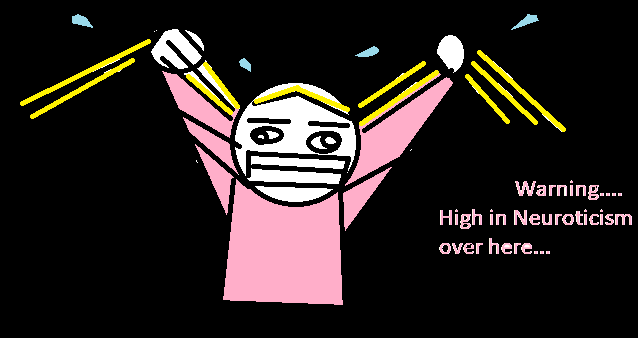
In the display above, one can see me pulling my hair out of my head. This is oftentimes what I feel like when I let my neurotic characteristics get to me. And fortunately while I still have hair (despite the times that I’ve wanted to pull it out of my head some days), it can be difficult to navigate life when one is prone to anxiety and constant worrying about the future. Since Neuroticism is the most primary feature that I can identify with on the FFM, I felt that it would be the best representation to use for this post.
eP Blog #7:
12/12/2020
Fairy-tales are interesting because when I was little, I never viewed them as more than fun stories about good guys and bad guys and happily ever after’s. It wasn’t until years later in high school when I first ran into the concept that these stories represented much more than a surface level understanding of good vs. evil. An example of this is the morality that one can derive from these stories as well as the cautionary qualities attached to them.
For instance, in Hansel and Grettle, it teaches children not to be lured in by something that looks good and go into a stranger’s home because it won’t end well for them (in most cases). In Goldie Locks, it centers on not trespassing and going into other creatures homes because again it isn’t right, and it won’t end well for you. So it is interesting to see that these fun little stories have deeper meanings to them that can help to teach children everywhere what to do in life and what not to do. The structure of these stories are also pretty short and might indicate that they are made in this way because the attention span of children isn’t that long and so they have to be dazzled by stories of strange characters like animals and candy houses in order to capture their attentions and imaginations. And I know for myself, this worked and it probably did similar to other individuals in other cultures.
I suppose an egalitarian character that represented my interests and that I looked up to when I was younger was Cinderella. She taught me the importance of being kind to everyone and the animals even when life is difficult and people aren’t kind back. She also exemplified that animals could be your closest companions and it rings true for me today. In addition to this, the evil character’s like her stepsisters and her stepmother taught me how to not treat a person and to remember that ideally, good is rewarded to those who treat people with kindness and do good to others. It also shows me that one can start out in a not-so-satisfying situation, (like Cinderella being a servant to her family) and then end with a happily ever after. The egalitarian qualities she showed inspires me today to continue fostering qualities that she manifested in the film – and to make sure that these characteristics transcend longer in what I do and the contributions that I hope to make in society today and everyday.

As can be read in the blog post, a general summary of why I chose Cinderella as a character I grew up with was because she was one of the first influential characters I grew to love and respect when I was little. In my mind, fairy tales offer more than just a simplistic understanding of idealized life but also give important life lessons and serve as models in which how individuals should treat one another.
Ep Blog #6: Autonomy & Self-Determination Theory
11/1/2020
According to the Self-Determination Theory (SDT), a person who embodies this idea do so by pursuing their ideas of satisfaction and happiness. (Matsumoto, 2017). The SDT can be seen in places like the United States of America, in which personal agency are aspects of American culture that I hold very dearly to myself, as I realize that not all countries encourage individual’s to pursue their happiness. I frequently engage in my personal pursuits so long as it results in productive advancements in my goals. In terms of academia, I seek autonomy, competence, and relatedness in a multitude of ways. Since the beginning of the school semester, I have attended virtual classes in the hopes of advancing my path towards graduation. Due to the flexibility in online classes, it is easy to plan around due dates but it is also easy to miss assignments if one does not have their autonomy in check. Being in virtual classes fosters autonomy because the individual is forced to make sure they are staying on top of assignments that are given to them, assignments are only accomplished when proper time management is enforced, and organization is stellar.
Competence is achieved through the various resources that I have been afforded as a result of taking online courses. By being apart of many online classes, I have the internet in which helps me with research as well as textbooks that I use in order to accomplish my homework. Furthermore, I have the wisdom of the professor as well as classmates in which I can learn from in order to grow as a person and satisfy the competence in the SDT theory.
Relatedness can be manifested based on a variety of factors in my life but probably none more so important than the relationships that I have formed online in some of my virtual classes. Due to the emphasized isolation that one experiences while going to school online, it can be difficult to experience the social aspects that in person schooling brings. However, through resources like zoom and discussion boards, interconnectedness is possible and has been done in my own life. In the research created by Cheunge Et al., I have experienced Ren Qing, which is a term used to describe relationships in which is based on reciprocity so that each person benefits from the interaction. In my experience online, students as well as professors are willing to help one another so that they can both benefit from the interaction. This is how I satisfy the relatedness that I require in order to thrive online.
References
Matsumoto, D. & Juang, L. (2017). Culture & Psychology (6th
Edition). CA: Wadsworth. ISBN: 978-1-305-86314-9

In the picture above, it is me sitting in front of a computer working. Since much of my life has been about staying connected and completing assignments virtually, I figured what would be the most accurate representation of today than me sitting at a computer staring blankly into the screen. That is the basic concept for the image and I believe that images don’t need to always be so deep and complex, but rather, can be just as “real” with a simple and honest portrayal of what an individual does with their time everyday.

Ep Blog #5: Who Am I?
10/12/2020
- I am kind
- I am awkward
- I am realistic
- I am hard on myself
- I am funny
- I am shy until you get to know me
- I am a patriot
- I am a TCK
- I am a worrier
- I am never at ease
Each of the qualities on the aforementioned list are items that represent a part of me. In general I am a person who worries a lot about their future and their place in the world. Although it can be dreadful worrying all the time, sometimes this worrying can force me to take action and cause me to plan ahead what my next steps will be so it does have some survival application that is useful at times. In addition to this, my worrying has led me to be realistic about the future which helps to counteract the fears that I might experience from time to time about the state of the world. I describe myself as kind not because I feel that I am perfect all the time but because one of my biggest pet peeves is when people are just rude. This is why I try to naturally come across as kind and helpful whenever I have the chance. As a perfectionist I have found that I am quite imperfect at many things, thus causing me to be very hard on myself and leading me to try to be more on top of what needs to be done.
Although I have found that many of the qualities that I have written above are more individualistic representations of my self concept, there is an item on that list that I might consider more of a collectivist attitude. The following aspect that I believe represents an interdependent aspect to my characterization is the “I am a patriot” statement. I realize that this might be ironic considering the USA tends to celebrate an individualistic mindset, but if there is ever a time that American’s might unite, it is when they are discussing their pride for this land. Patriotism is interdependent by nature as it describes a loyalty or a strong affiliation to something that is bigger than themselves. In this case, a whole country. I believe based on the list that I have come up with that I am clearly an American in the sense that I believe in personal agency and in aspiring to better one’s self by attaining the best means possible for oneself and to pursue one’s goals if it will make them happy,

Image above created by Simone Leighton Using Paint Software.
I chose to create the image above because I feel it represents how my background has shaped who I am. Because I have been fortunate enough to have traveled around the world, it allows me a greater perspective and thus that is manifested in me hugging the world and being equal to the size of it.
eP Blog #4: Exam 1: Review
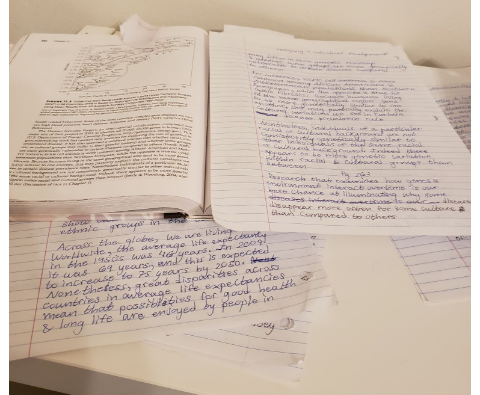
12/12/2020
There were several questions that I had gotten wrong on the first exam and after reviewing those questions I came to the conclusion that I need to implement better note taking as well as using better time management in order to prepare for the next exams. The notes that I had taken before hand were more vague and covered less of the chapters and were more related to the key concepts of the chapter rather than every case study that was written in the text. I have learned to examine the details of each case study more thoroughly in order to capture specific information that might be on the next exam.
In the past I’ve often taken classes that have offered ways in which I could be better at organizing the information in my notes as well as the material in the textbook. One idea is to write down the contents of each chapter and then on another page, fold it in half- hot dog style, and at the top of the page on the left side of the fold *insert whatever heading you like* and do the same on the right side of the centerfold. This way you can add notes in regards to the previous page’s content like definitions or side notes to help you work the text into your head. Coming up with creative measures to improve notes also helps to make notetaking less dry and boring and more of an enjoyable experience that can help one to absorb material while notetaking.
I have found that by paying attention to the case studies, the more success I will face on the next exams and hopefully the more prepared I will be in order to improve my score. In the past I have tried to type my notes out but I find that I absorb more information by handwriting everything written from each chapter. It is said that muscle memory helps recall when trying to take an exam and I feel that this is especially true for me. So by knowing techniques that work best for my study habits is the best course of action in order to do better next time and hopefully with the areas that I struggle with material-wise, I will be able to do better on in the future as well.
eP Blog #3: NEO Personality Test
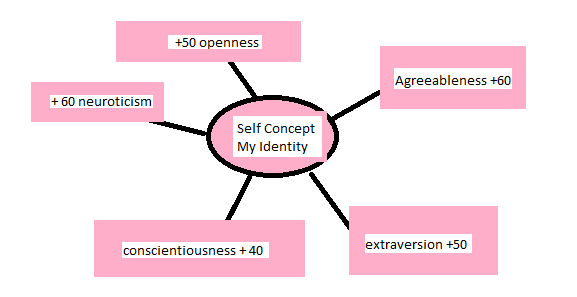
12/12/2020
According to the NEO Indicator, I scored a + 40 for agreeableness, + 40 for conscientiousness, + 50 for extraversion, + 60 for neuroticism, and +50 for openness. Reviewing the scores to these categories I am once again reassured that this test accurately reflects a large proportion of my personality, especially when it comes to neuroticism. I find it being extremely consistent with the previously mentioned category because I feel I am in a constant state of worry. Much of the time I find it hard to turn off my brain and not think about the future or any impending doom that may happen. In general, I will worry about events to the extent that there is some type of threat around me even though there isn’t any. I guess one could say that I am just a highly anxious individual and my neuroticism score certainly reflects this.
Other areas that I feel reflect my personality accurately include agreeableness, extroversion as well as conscientiousness. Conscientiousness in the test is described as an “individual who is guided by an inner sense of what is right”. Some of the qualities that one might associate with this type of characteristic is that person being “meticulous” or “detail oriented.” Overall, maybe I don’t give myself enough credit because when it comes to something I am passionate about, I can be quite a perfectionist and hard on myself. However, when it is something that I don’t find interesting, then I tend to relax my effort and not care as much about certain things. This can be bad because not everything in my life is interesting, however, that doesn’t mean they aren’t important and don’t require my attention or effort. I can equate this to many school assignments or work for my part time job. Overall, the NEO is pretty accurate in the sense that it seems to have managed to capture a broad overview of where my strengths and weaknesses lie and I sort of understand why the length of the questionnaire is so endless.
eP Blog 2: Values That Have Inspired Me Throughout My Life
9/27/2020
As a result of having grown up in different parts of the world, from an early age, it became very clear to me that tolerance is the foundation for everything that my parents wanted to have instilled in me. While growing up, I was a creative individual and dreamt of becoming many things from a singer and artist to even a judge. University was also a prospect that my Mother had always dreamt for me. She had never been to college and as a result of being the only daughter in my family, it was important for me to make her dreams come true, as well as my own. This was one of the main drives of going to university. She as well as the rest of my family, has been a constant source of encouragement and leading me to make better decisions for myself- as friends, schools and teachers were never a permanent fixture. However, once I graduated high school, I was set on pursuing a career in psychology as I understood that mental health was an interest that I wanted to understand more about. However, this was a vain pursuit as my real talents lay in who I had always been- artistic and creative. However, although I had picked the wrong major, all of the values that I had been raised with, such as tolerance, accountability, and personal agency awakened in me and kept me from languishing in despair.
It was through the previously mentioned qualities, that I found redirecting my life was as automatic to me as breathing due to the many detours of traveling. It was through this gradual realization that my current major wasn’t suitable for what I wanted with my life, that I was confronted by hard reality. I was too far in my degree to switch and my parents and I were aware of how costly it was being delayed from graduating due to Old Dominion rejecting some of my previous transfer credits. This being said, I learned how to take accountability for my initial commitment to my degree, and have realized that one of the biggest lessons that I could learn in this situation is that although this isn’t ideal, it is not the end of the world. So therefore, press on, and hold oneself accountable for what was started and complete the process.
In order to mobilize my progression to graduate, I needed to assemble the proper credits needed to take upper level courses in university. One of the credits that was rejected, happened to be a math credit. After doing some research on ODU’s website, I saw that it offered examinations in which allowed students to test their knowledge and supersede an entire semester of that subject material. Realizing this opportunity, I took it upon myself to study the CLEP exam in order to gain a college credit for a math course that I require. At first I felt overwhelmed by the prospect of teaching myself a subject that I have famously been known to struggle in, but the more I persevered and organized my self through personal agency, I became more confident in my own abilities to achieve a goal.
Before having been in university, there have been many times when I could remember that tolerance was a critical aspect in who I was as a person. Being forced to live in many different communities from one’s own, teaches one to put their own political views aside and foster empathy. This tolerance has made me a better person because I understand that each individual is entitled to their own political beliefs and opinions, and no matter what side they fall on the political spectrum- conservative or liberal, they should be treated with respect. At times it can be difficult to do, especially in today’s climate, but if I am not kind to someone else for their views, how can I expect the same treatment in return when I think differently than someone else?
As I recalibrated my goals and became more self-assured in what I wanted to do with my life. I have come to understand that each moment of difficulty has allowed me to express each of the qualities that were encouraged in my family. It is through tolerance, accountability, and personal agency that has given me the necessary characteristics needed in order to thrive in the foreign service. I am familiar with being in vastly different cultural settings, learning to deal with situations that do not benefit me, and acquiring personal agency that has prepared me for continuing to serve American citizens overseas.
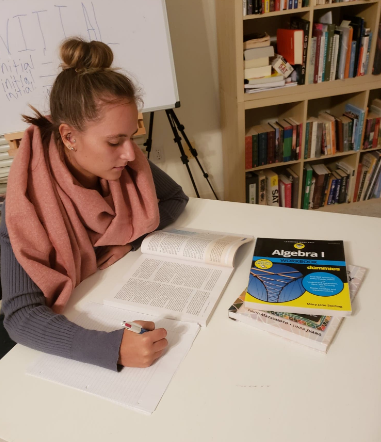
I chose the above picture because I have been studying for the CLEP exam in order to get a college credit that will allow me to skip having to take a whole semester of college algebra- which I have already completed at my former university in California. This image is significant to me because it keeps me motivated to continue pursuing my major and to remind myself to keep myself accountable of achieving my goals.
Pages: 1 2
